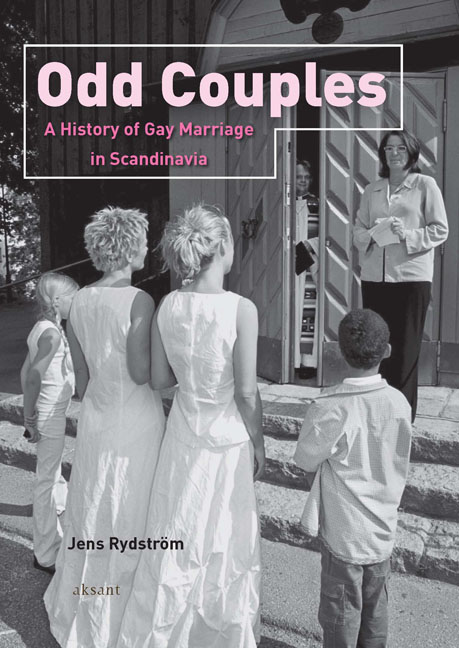Book contents
- Frontmatter
- Contents
- Preface
- Introduction
- Chapter One The Road to Registered Partnership
- Chapter Two Is Marriage what we want?
- Chapter Three Gay Marriage in Mainstream Politics
- Chapter Four Implementation
- Chapter Five Gender and Marriage Statistics
- Chapter Six The Next Step
- Summary and Conclusions
- Notes
- Appendix: Political Parties and Gay and Lesbian Rights Groups in Scandinavia
- References
- Index
Chapter Two - Is Marriage what we want?
Published online by Cambridge University Press: 20 January 2021
- Frontmatter
- Contents
- Preface
- Introduction
- Chapter One The Road to Registered Partnership
- Chapter Two Is Marriage what we want?
- Chapter Three Gay Marriage in Mainstream Politics
- Chapter Four Implementation
- Chapter Five Gender and Marriage Statistics
- Chapter Six The Next Step
- Summary and Conclusions
- Notes
- Appendix: Political Parties and Gay and Lesbian Rights Groups in Scandinavia
- References
- Index
Summary
The demands for legal recognition of same-sex couples are not new. Ceremonies of friendship and other forms of bonding necessarily have copied heterosexual forms for contracting marriage. In 1884, the deeply religious Swedish philosopher Pontus Wikner wrote in his secret diary about his love for other men. He deeply regretted the wrongs he had done to his wife, and he suggested a remedy for the suffering he and those who were like him had to endure and had inflicted on others:
Could it not be possible, that an exceptional status be granted to such people who are my equals, so that if they could find a being of their own sex, who could reciprocate their love, they could enter into matrimony with each other? … Oh humans, humans, be merciful! I know what the Bible says, but could there be no exceptional status for exceptional people? If I could receive this alliance praising God and another person could do the same with me, why could we not be allowed to?
Wikner died in 1888, but his secret diary was not published until 1971, more than eighty years after his death. His highly-strung prose was typical for his life and time, but his frank confessions about his erotic feelings for men were not. Apparently he had not read any of the emerging literature about homosexuality and the third sex. For Wikner, his feeling for men was something that had to be negotiated with the Church and with his personal faith. But the world was going to change profoundly after his death, when lesbian and gay organisations appeared and grew in importance.
There were no organisations for the third sex in Scandinavia before World War Two, even if some individuals had contacts with Magnus Hirschfeld's Institut fur Sexualwissenschaft in Berlin. Between 1948 and 1950, however, homophile organisations were founded in Denmark, Norway, and Sweden. By the end of the 1950s these movements were rather well established, with their own publications, social events, and political lobby groups manned by volunteers in the capitals, as well as elsewhere. However, they were forced to be discreet and very cautious by the homophobic political climate of the 1950s.
- Type
- Chapter
- Information
- Odd CouplesA History of Gay Marriage in Scandinavia, pp. 69 - 90Publisher: Amsterdam University PressPrint publication year: 2012



